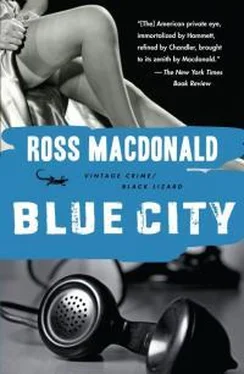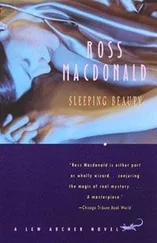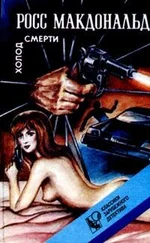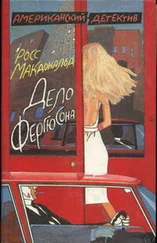Ross Macdonald
Originally published under the name Kenneth Millar
BLUE CITY
1947
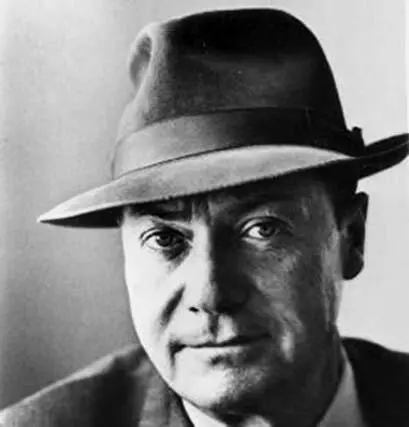
Ross Macdonald’s real name was Kenneth Millar. Born near San Francisco in 1915 and raised in Ontario, Millar returned to the United States as a young man and published his first novel in 1944. He served as the president of the Mystery Writers of America and was awarded their Grand Master Award as well as the Crime Writers’ Association of Great Britain’s Gold Dagger Award. He died in 1983.
All the time you’ve been away from a town where you lived when you were a kid, you think about it and talk about it as if the air there were sweeter in the nostrils than other air. When you meet a man from that town you feel a kind of brotherhood with him, till the talk runs down and you can’t remember any more names.
The city started sooner than I expected it to. In ten years it had crawled out along the highway, covering new farms with the concrete squares of suburban developments. On both sides of the highway I could see the rows of little frame houses, all alike, as if there were only one architect in the city and he had a magnificent obsession.
“It won’t be long now,” the transport driver said. He yawned over the wheel, keeping his eyes on the road. “I don’t need any dago red to put me to sleep tonight.”
“You live here?”
“I got a room in a boardinghouse at this end. You could call it living, I guess.”
“Don’t you like the town?”
“It’s all right if you don’t know any better places.” He spat through his open window into the current of air that the truck’s movement made, and a fine spray blew across the back of my neck. “I call Chicago home. That’s where my wife is.”
“That makes the difference.”
“You married?”
“No,” I said. “I’m traveling on my own.”
“Looking for a job, eh?”
“That’s right.”
“You shouldn’t have any trouble here. Matter of fact, we need helpers down at the depot right now. Half the time I have to load my own truck. You strong enough?”
“Yeah, I’m strong enough. But that’s not the kind of a job I was thinking about.”
“Pretty good pay. Seventy cents an hour. You can’t do better than that around here.”
“Maybe I can. I’ve got connections.”
“You have?” He gave me a quick look. I wasn’t looking so good. I hadn’t shaved or washed that day, and my clothes had been slept in.
He must have decided I was lying. He said with broad irony: “Oh well, in that case,” and stopped talking to me.
The highway had changed into the east end of the main street, half residential and half business. Neighborhood grocery stores, coal yards, gas stations, cheap taverns, big old rundown houses, a few churches with blank embarrassed faces. I couldn’t remember the buildings ahead of time, but nearly everything was familiar once I saw it. I caught a whiff of the rubber factories on the south side, corrupting the spring night like an armpit odor. I watched the suppertime crowds on the street, looking for someone I might remember.
The driver applied the brakes, and the truck came to a stop at the curb.
“I’ll let you out here, bud. I can’t take you down to the depot.” He nodded toward the “No Riders” sticker on the windshield. “But in case your connections don’t pan out, you want to come down there. It’s on Masters Street.”
“Thanks. And thanks for the ride.”
I hoisted my canvas suitcase from under my feet and climbed down out of the cabin. The big truck moved away and left me standing on the curb.
I walked a couple of blocks in the direction the truck had taken, but I was in no hurry to go anywhere. The excitement I had felt on coming back to the city had worn off already. Men and women passed me going both ways, but they were nobody I knew. A policeman gave me a sharp glance. I realized that I must look like a bum, and the realization made me feel like one. I began to wonder for the first time that day if my connections in the town were worth anything. Perhaps they didn’t even exist any more.
I passed a new apartment building whose windows were like holes in a box of light. Through one of them I caught a glimpse of a man and woman dancing to the radio, holding each other close. It was enough to bring back the feeling of loneliness that I had been having off and on for years. I wanted to know every room in every apartment in that building I had never seen before, and call everyone who lived there by his first name. At the same time I wished I had the power to destroy the building and everybody in it.
I hadn’t had a fight for a long time, and I was spoiling for one.
Across the street a neon sign said: “Schlitz Beer on Draught,” and I crossed to it. The plate-glass window of the tavern was half-curtained, but I could see over the curtain. It was a big square room full of wooden chairs and tables, with a bar at the back. In the cold yellow light of the fly-specked ceiling lamps, I could see that the tables were scarred by carved initials and the charred grooves left by untended cigarettes. The place was almost empty, and the few people that were there didn’t look as if they’d make me feel out of place.
I went inside and sat on a stool at the bar. The bartender paid no attention to me. He was busy being a character for the benefit of a couple of other customers, a peroxide blonde and a henna redhead at the other end of the bar. The girls were sitting one on each side of a big young man in a topcoat made of imitation llama.
“So you want another drink,” the bartender said with a wide cruel smile. “You think I got nothing better to do than give you another drink. Don’t you know by this time of night all I can think about is my feet? My feet are killing me.”
“Is that a promise?” the peroxide blonde said in a shrill, peroxide-blonde voice. The women giggled, and the man between them hugged them, one under each arm.
“The way you talk,” the bartender said, “the way you talk, you’d think I get paid money to stand here and feed you characters whisky – when all the time my feet are killing me.”
He was gray-headed and massive. His belly hung out over his belt and swayed like a huge bosom when he moved.
“You should try reducing, Henry,” the blonde said. “Take some of that weight off your feet.”
“Okay, okay,” the bartender said. “You asked for it and you’ll get it. But I warn you this bar whisky is the lousiest stuff this side of the sewer farm.” He poured three shots out of an unlabeled bottle and set them on the bar.
“You should know, Henry,” the blonde said.
“It’s mother’s milk to me,” Henry said.
I rapped on the bar with a quarter.
“Somebody’s getting impatient,” Henry said. “When somebody gets impatient that makes me nervous. When I get nervous I’m no damn good for anything at all.”
“A bottle of beer,” I said.
“Look at my hand,” Henry said. “It’s trembling like a leaf.” He held out a big gray hand and smiled down at it. “Beer, you say?”
“If this place is still in business.”
He took a bottle out of the cooler, uncapped it, and shuffled along the bar towards me.
He looked at me with potential dislike. “What’s the matter, you got no sense of humor?”
“Sure, but I checked it in another town. Go right on being sidesplitting for your friends.”
“You’re a stranger in town, aren’t you? Maybe you just don’t know how we talk around here.”
Читать дальше
